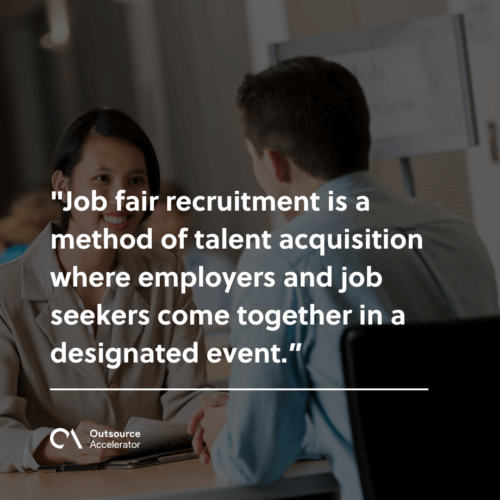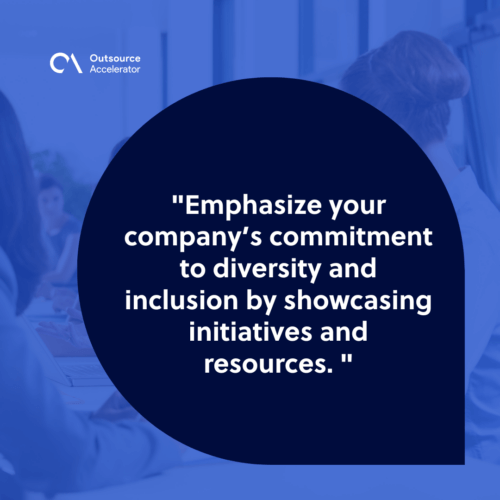Job fair recruitment: Everything you need to know

Despite the prevalence of online alternatives, the concept of job fairs has withstood the test of time.
Job fair recruitment is a valuable platform that brings together seekers and employers. It creates a unique opportunity for face-to-face interactions and connections in an increasingly digital world.
These are more than just events. With a multitude of companies and candidates under one roof, they are invaluable opportunities to showcase skills, network, and make lasting impressions.
If you want to make the most of these high-energy events, understanding the dynamics of job fair recruitment is your gateway to unlocking the door to hiring promising talent.
What is job fair recruitment?
Job fair recruitment is a method of talent acquisition where employers and job seekers come together in a designated event. This usually occurs in a large physical venue, with online job fairs being less common.
A job or career fair serves as a platform for employers to showcase their organizations and open positions to potential candidates. On the other hand, job seekers attend these events to explore various career opportunities.
Job fair recruitment offers face-to-face interaction that allows both parties to gauge a potential fit. Successful interactions lead to interviews, job offers, and networking connections.

Benefits of job fair recruitment
Job fair recruitment offers numerous benefits for both job seekers and employers, making them a valuable resource in the recruitment process.
Check out the benefits that both sides receive:
Benefits for job seekers
Here are some benefits of job fair recruitment for job seekers:
- Direct interaction – Candidates have the chance to engage directly with recruiters, allowing them to make a memorable impression and receive immediate feedback.
- Networking opportunities – Job fairs provide a concentrated environment where professionals can meet multiple employers in one location, making networking more efficient.
- Visibility – Attending job fairs lets job seekers showcase their skills and personalities beyond what’s possible on a resume or virtual platform.
Benefits for employers
Job fair recruitment provides the following advantages to employers:
- Direct engagement – Company representatives can engage directly with candidates, assess their communication skills, and gauge their suitability for the company culture.
- Efficient talent sourcing – Job fair recruitment provides a concentrated pool of potential candidates actively seeking opportunities, streamlining the initial recruitment stages.
- Brand visibility – Job fairs provide opportunities to enhance an employer’s brand visibility and affinity.
How to prepare for job fair recruitment
Job fairs are major events, and it’s important to prepare for them accordingly.
By following these steps at all stages of job fair recruitment, a recruiting team can maximize its chances of identifying top talent.
Before the job fair
Take these steps to prepare before the job fair:
- Research participating companies. Thoroughly research the other companies attending the job fair to familiarize yourself with their industries, values, and available positions. This can help you tailor your own approach to job fair recruitment.
- Review job descriptions. Carefully review and update your job descriptions to ensure they accurately reflect the skills and qualifications you’re looking for.
- Prepare a compelling booth. Ensure you have all the necessary materials for your booth, including brochures, business cards, and branded giveaways.
During the job fair
Remember these steps during the actual job fair:
- Provide comprehensive information. Make sure your team is well-versed in all aspects of your company and available positions.
- Answer questions clearly. Prepare to answer questions about your company, vacant positions, the recruitment process, and benefits packages.
- Promote diversity and inclusion. Emphasize your company’s commitment to diversity and inclusion by showcasing initiatives and resources.

After the job fair
After the job fair, you must:
- Provide feedback. Offer constructive feedback appropriate to candidates. A positive interaction leaves lasting impressions and encourages future applications.
- Maintain a candidate database. A candidate database allows you to refer back for future job fair recruitment, streamlining the process.
- Reflect. Think back on your strategy and consider what improvements can be made for the future.
9 tips on how to achieve success in job fair recruitment
To ensure positive outcomes and attract skilled individuals, you can follow these tips in job fair recruitment:
1. Set clear objectives
Define your goals and objectives for the job fair. Determine the number of job openings you aim to fill, the type of candidates you seek, and any specific messages you want to convey about your company.
Clear objectives for job fair recruitment keep you focused and measure your success.
2. Create an appealing booth
Design a visually appealing booth that represents your company’s brand and culture. A well-designed booth attracts seekers and stands out among other exhibitors.
Ensure easy navigation and information accessibility with your booth’s content.
3. Prepare your team
Invest time in training your job fair recruitment team. Ensure they’re well-informed about the company’s culture, values, and available job offerings.
Your knowledge will instill confidence in candidates and enhance their interest in working for your company.
4. Engage proactively
Encourage your team to be approachable and friendly. Create an inviting atmosphere that encourages candidates to approach your booth and engage in conversation.
Actively engage seekers by asking open-ended questions about their skills, experiences, and career goals.
5. Highlight your company’s value
Showcase what makes your company unique in the crowded market. Share success stories, anecdotes, and examples illustrating your company culture and the employee experience.
You can attract candidates who align with your values and offerings by highlighting these aspects.
6. Collect candidate information
Have a system in place for collecting resumes or contact information from interested job fair attendees. This data is crucial for following up and further evaluating potential candidates.
7. Conduct initial interviews
You can use the job fair as an opportunity to conduct brief initial interviews. This allows you to assess candidates’ qualifications, abilities, and cultural fit.
You’ll be able to identify promising candidates and fast-track the selection process.
8. Follow up promptly
Promptly follow up with candidates who expressed interest in your organization. Prompt follow-up demonstrates professionalism and a commitment to building relationships.
Even if they may not ultimately be hired, it’s good to keep in touch for future positions or referrals.
9. Evaluate and learn
After the job fair event, gather feedback from your team and assess the event’s success. Identify areas for improvement in booth design, messaging, or engagement strategies. Apply them to recruitment efforts for future job fairs.
Job fair recruitment: Attract the best potential talents
Job fair recruitment isn’t likely to disappear in the near future. As has been said, its strength lies in its unparalleled ability to bring together job seekers and employers in a dynamic and impactful way.
Though digital methods are becoming more common, especially when hiring remote workers, career fairs still remain a top approach to attract suitable candidates with the most potential.
As you find job candidates, remember that the ultimate goal is to fill positions and build a team that aligns with your company’s vision and long-term success.







 Independent
Independent




